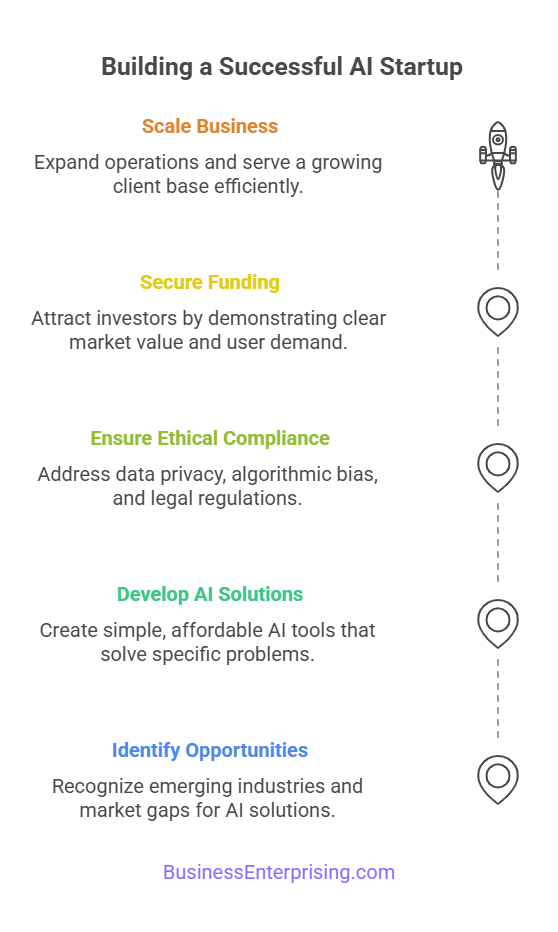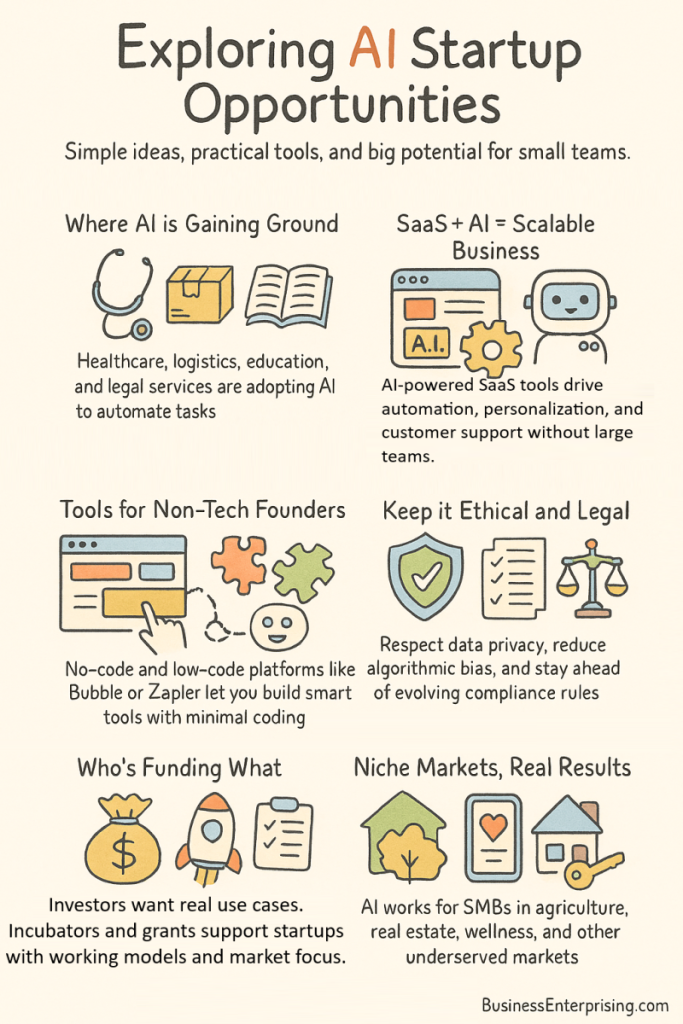 AI startup opportunities are expanding fast as tools become more accessible and demand for automation continues to grow. You no longer need a technical degree or a large team to launch something useful. The shift toward low-code platforms and prebuilt models has changed how ideas become products.
AI startup opportunities are expanding fast as tools become more accessible and demand for automation continues to grow. You no longer need a technical degree or a large team to launch something useful. The shift toward low-code platforms and prebuilt models has changed how ideas become products.
Additionally, small businesses are starting to explore AI for the first time. Many are looking for tools that save time or reduce costs. Therefore, founders who offer simple, affordable solutions often gain traction quickly. These users may not care about advanced features, but they value speed and ease of use.
You may also notice increased investor attention. Many firms are now backing early-stage startups with clear use cases and working prototypes. However, funding alone doesn’t guarantee success. You still need to show value, reduce risk, and build something people actually want to use.
AI also raises ethical and legal questions. Data use, transparency, and model fairness matter more than ever. Therefore, you must build with care. These issues affect how people view your product and whether they trust your brand.
If you’re considering building a business, now is a smart time to explore AI. Focus on solving problems that people face every day. Keep your model simple, your goals clear, and your users in mind. That’s where the best ideas often begin.
Emerging Industries Ripe for AI Disruption
Some industries are just beginning to see the real benefits of artificial intelligence. Healthcare, logistics, education, and legal services are all strong candidates for AI disruption. These sectors rely heavily on data, but many still use outdated systems that slow progress and increase costs.
For example, healthcare generates massive amounts of data daily. However, most clinics and hospitals still struggle with managing patient records, diagnostics, and scheduling. Therefore, startups that offer smart automation, predictive analytics, or virtual assistants have strong entry points. Additionally, AI tools can help reduce burnout among professionals by taking over repetitive tasks.
Logistics also shows significant gaps. Many supply chains still run on manual coordination or basic software. AI can improve routing, reduce fuel costs, and predict delivery issues. As more businesses move to e-commerce, demand for efficient logistics technology grows rapidly. This opens the door for startups that want to streamline operations across regional or global networks.
Education is another area gaining attention. Traditional learning methods still dominate many classrooms, but remote learning has shifted expectations. Therefore, AI tools that adapt to student performance or provide instant feedback now hold real value. Additionally, schools and training centers need smarter tools to measure outcomes and personalize instruction.
Legal services are also changing slowly. Many small firms still manage research and documentation by hand. However, AI can automate contract review, case research, and even compliance tasks. These changes help reduce overhead and improve service speed.
You should keep a close eye on these sectors if you’re evaluating AI startup opportunities. Each industry has gaps that smart, focused technology can fill quickly. And because many players are slow to adapt, startups have a chance to lead.
AI-Driven SaaS Business Models
Software-as-a-service continues to grow fast, especially when paired with artificial intelligence. Many startups are using AI to improve SaaS tools. These improvements often focus on automation, personalization, and customer support. As a result, businesses can work faster and smarter with fewer people involved.
AI tools now handle tasks that once needed full-time teams. For example, customer service chatbots can answer basic questions, freeing time for your staff. Additionally, data analytics tools can quickly scan and summarize reports that would take hours to read. These services save time, reduce errors, and improve decision-making.
Personalization is another strong area for SaaS products. You can use AI to adjust content, pricing, or recommendations based on user behavior. Therefore, you can improve customer satisfaction without hiring extra staff. This makes your software more valuable and harder for clients to replace.
Automation also improves internal business operations. AI tools now handle sales follow-ups, billing reminders, and inventory updates. These processes happen around the clock without interruption. Additionally, many platforms offer API connections that make integration with other systems simple.
The combination of SaaS and AI offers strong long-term value. Once your system works, it becomes easy to scale. You can serve thousands of clients with only a small support team. This scalability is what makes AI startup opportunities in SaaS so attractive. If you are building a tech business, consider starting with a SaaS model. Look for ways to save users time or improve their results. Focus on repeatable outcomes that businesses can trust. AI gives you the tools, but your service must solve a real problem.
Low-Code/No-Code AI Tools for Non-Technical Founders
You no longer need a coding background to build a tech startup. Low-code and no-code tools now make it easier than ever. Platforms like Bubble, Zapier, and OpenAI APIs allow you to launch software without writing complex code. This change opens the door to a wider group of founders.
Many entrepreneurs now use visual builders to create apps and workflows. You can launch a working product without hiring developers right away. Additionally, you can test your ideas faster and adjust based on real feedback. This speed helps you avoid wasting time or money on unproven ideas.
AI tools can now be added to these platforms with just a few clicks. For example, you can connect a form to an AI model to summarize input. Or you can use automation to handle repetitive tasks like email follow-ups or appointment scheduling. Therefore, your startup can offer smart features without a large technical team.
The combination of AI and no-code platforms creates real value for customers. You can build products that look polished and work well across devices. Additionally, you can focus more on customer problems instead of technical hurdles. That freedom lets you move faster and build smarter.
AI startup opportunities are no longer limited to developers or data scientists. You can build useful tools and platforms using simple, accessible resources. If you have a business idea, these tools give you a clear path to test and launch. Focus on solving problems, and let the platforms handle the complexity.
Regulatory and Ethical Considerations in AI Startups
As AI startups grow, so do concerns about ethics and regulation. You need to build products that respect user rights and legal limits. Data privacy is one of the most important areas to address. If your tool collects personal data, you must clearly explain how it’s stored and used.
Additionally, many countries now require consent before gathering certain types of data. You should also allow users to opt out or delete their records. These steps may seem small, but they affect trust. When users lose confidence, your product will lose traction fast.
Another major concern is algorithmic bias. AI models learn from historical data, which can contain errors or unfair patterns. Therefore, if you’re not careful, your product may reinforce those biases. This can create legal risk and damage your brand. You must test your models often and improve them as needed.
Compliance is also a moving target. Regulations change, and new laws may apply depending on your product or market. Additionally, industries like healthcare and finance have stricter rules for AI usage. You must plan ahead and build flexibility into your platform.
AI startup opportunities still offer strong potential. However, long-term success depends on building responsible systems. You should make ethics part of your design process from day one. Clear policies, strong data controls, and regular model audits all help you stay ahead. If you take these steps early, you will avoid bigger problems later.
Funding Trends and Investor Interest in AI Startups
Investors continue to show strong interest in artificial intelligence. Venture capital firms are actively funding early-stage AI startups across many sectors. However, they now focus more on products with clear market value and solid user demand. You need more than a demo to attract funding.
Additionally, many incubators now support AI-focused companies. These programs offer mentorship, office space, and investor introductions. Therefore, joining an accelerator can help you refine your pitch and build traction. You may also gain access to technical support or free tools through partner networks.
Grant programs also play a growing role. Government and university-backed funds often support AI tools that serve public good. If your project addresses healthcare, education, or climate problems, you may qualify. However, most grant applications take time and require detailed plans.
Private investors are also shifting strategies. Many now look for companies that pair AI with strong domain expertise. Therefore, your team should show both technical skill and business knowledge. You should also be clear about risks, such as bias or data privacy.
AI startup opportunities are still well-funded, but competition has increased. You must show results, not just potential. Build something simple that solves a real problem. Then test it and show how users benefit. If you focus on value, you’ll gain attention from the right backers.
AI Use Cases for Niche Markets and SMBs
Artificial intelligence is no longer limited to large corporations. Small businesses and niche markets are now finding value in smart, targeted AI tools. These tools help you save time, reduce errors, and improve decision-making without needing a big budget.
For example, farms now use AI to predict weather patterns and monitor crop health. These tools reduce waste and improve yields. Additionally, small real estate firms use AI to match listings with buyer preferences. This speeds up closings and improves client satisfaction. These benefits were once limited to big agencies but are now widely accessible.
Wellness providers also benefit from AI tools. You can automate appointment scheduling, manage reviews, and even personalize fitness or diet plans. Therefore, solo practitioners and small studios can compete with larger franchises. These changes level the playing field and reduce overhead.
You should also consider how AI can help with marketing. Many small businesses now use AI to write emails, manage ads, or track customer behavior. Additionally, AI chatbots now handle simple service requests, which improves response times and reduces labor costs.
AI startup opportunities continue to expand in small and underserved markets. These users often have specific needs and limited resources. Therefore, your product must be affordable, focused, and easy to use. If you can solve a real problem simply, adoption will follow.
Conclusion
AI is changing how businesses start, grow, and compete. You no longer need a large team or budget to build something smart. Tools are now more accessible, and support networks continue to grow. Therefore, you can move from concept to launch faster than ever before.
Additionally, investors are paying attention. They want to see working products, clear value, and responsible design. If you build something useful, people will support it. However, you must think ahead. Data use, model bias, and legal compliance are not optional. These areas affect how your product performs and how others trust it.
Many startups still overlook small business needs. That gap creates opportunities for those who can deliver focused, affordable solutions. For example, simple automation or smart recommendations can create big value for busy users. Therefore, your best move may be to solve a smaller problem very well.
You should also consider building on no-code tools. They reduce your time to market and cut early development costs. Additionally, they allow you to test before investing more. This lean approach helps reduce risk and improve your results.
AI startup opportunities are still strong, but success depends on execution. Your idea must solve a problem clearly and consistently. If you stay focused on value, you can build something worth scaling. Think practically, move quickly, and test often. That’s how strong companies begin.



